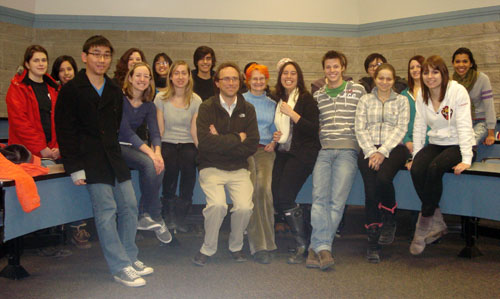
After a semester’s hiatus, the Pet Loss Support Hotline (PLSH) is up and running again. Created in 2001, the program is staffed by student volunteers but needs a faculty adviser. When no one was available to lead the program last semester, the hotline had to shut down.
Now Prof. Michael Meehan, Population Medicine, has stepped in as the faculty adviser – a natural fit, because his areas of expertise are improving veterinary communication skills, coping with grief and the human-animal bond. “The strength of the bond between people and their animals can be very strong,” says Meehan. “At OVC we recognize that the importance of that bond needs to be acknowledged when the animals have health problems.”
The hotline volunteers are all students at U of G. Two of this semester’s 26 volunteers are Denise Yates, a fourth-year biosciences student hoping to become a veterinarian, and Anik Bay, a phase 2 DVM veterinary student.
The students commit to one shift and one debriefing session each month. The hotline (519-824-4120, Ext. 53694) is staffed on Tuesday, Wednesday and Thursday evenings from 6 to 9 p.m., and is connected to an answering machine at other times. (Volunteers will return messages left on the answering machine.) Calls come in not just from the Guelph community, but from as far away as Calgary, Alta., and California.
The hotline’s main goals are to provide a supportive listening environment for pet owners who are considering euthanasia and those whose animals have died. “We get calls about making decisions to end a pet’s life, and about the grief people feel after losing a pet,” says Yates. “People often ask, ‘Is it normal for me to feel this bad for this long?’”
Legitimizing and normalizing grief is an important goal of the hotline. Friends and family may not understand how strong the bonds can be and how heartbreaking it can be to lose a cherished animal; that can make the grieving process much more difficult.
It’s not easy for the volunteers, either. “To be honest, when I started doing this I had tears in my eyes at every call,” says Bay.
Meehan adds that volunteering for the hotline “is very beneficial to students planning to be veterinarians, and anyone who wants to be able to support others through grief. It teaches them the skills they need, skills they’ll use every day in their work. They get practice in listening to people, sharing bad news, talking to people about options.”
The American Veterinary Medicine Association, Meehan says, has guidelines for schools offering hotlines that recommend research on the effectiveness of the service and on the potential stress for the volunteers. Despite that, few studies have been done.
With that in mind, Meehan has begun some research by contacting those who called the hotline over the past three or four years, asking them questions about their experience, and how they are feeling now about the loss of their animals and the value of the PLSH service. “It’s about accountability,” he says. “We need to be sure this service we’re offering is beneficial to the callers.”
His second research project evaluates the effectiveness of the training and debriefing sessions in preparing and supporting the volunteers. “What we learn from both of these studies will go directly into the training,” he says.
So far, Meehan has found the responses (while not yet analyzed) to be overwhelmingly positive. “People find it very helpful to talk to someone about how they are feeling.” He adds that there have also been suggestions for improvements and ideas for additional services such as support groups where people could meet with others who have lost animals.
In his training sessions, Meehan uses videos of actors as well as live actors from the pool of actors used in the DVM program. With the live actors, students sit back to back with their “caller” since on the phone they won’t be able to see facial expressions to help them understand.
“The students can ask for a ‘time out’ to discuss the situation with me, or can ask to ‘rewind and start over’ when it’s not going well,” Meehan says. This experiential learning experience is very powerful because volunteers have the opportunity to revisit and rehearse effective veterinary communication skills.
Bay explains that, besides the training, volunteers all begin as “juniors” and later become “seniors.” She says: “The seniors can take and return calls, while the juniors listen to the calls and discuss them afterwards with the senior. Then when they’ve had enough experience as a junior – at least one semester, but sometimes longer – they become a senior and take their own calls.”
Yates adds: “We have a package of materials that we send to people to help them with their grief, and we also send a condolence card with a personal message.” Many people will call back more than once. And many write back; there is an entire binder of cards and letters expressing appreciation for the support received.
Meehan hopes to eventually create a training module based on the research to share with veterinarians in practices. “Veterinarians have the ability to alleviate or aggravate their clients’ grief process,” he says. “Often when pet owners are in great distress, it’s because of something that happened at the veterinary clinic. Maybe they weren’t told about what might happen when the animal was euthanized, or the veterinarian may not have handled the situation well when their pet died unexpectedly. As veterinarians, we have a communication responsibility to our clients during these difficult times.”